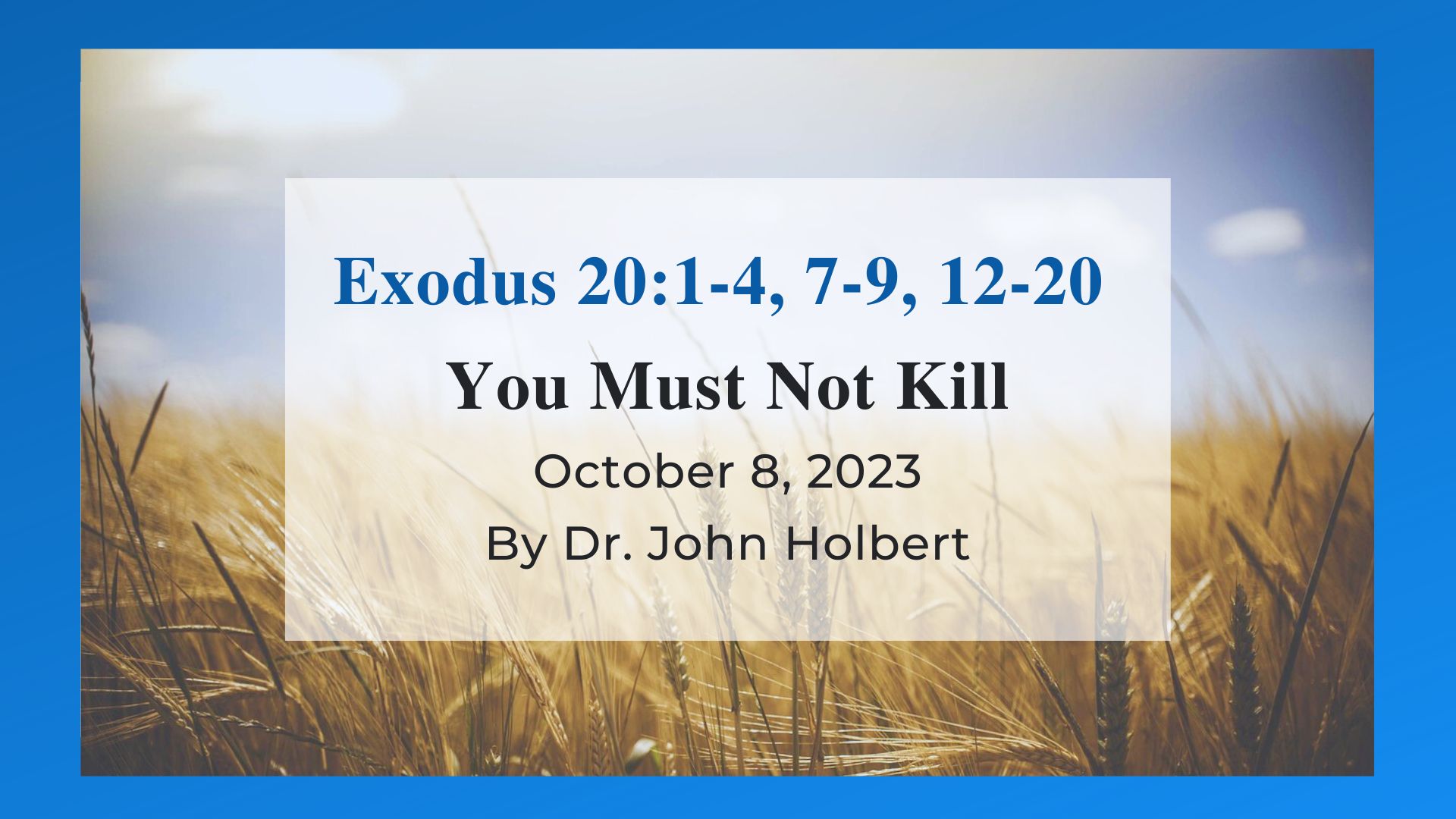You Must Not Kill - Reflections on Exodus 20:1-4, 7-9, 12-20
by Dr. John Holbert on Tuesday, October 3, 2023

You Must Not Kill
Exodus 20:1-4, 7-9, 12-20
The Peripatetic Hebrew Bible Preacher
Whenever I write about the 10 Commandments, I urge all preachers to select only one of them as a basis for a sermon; no one can do any real justice to all ten or even five or even two of these ancient and hallowed and too often misrepresented list of commands in one sermon. So, I say again: choose one for the day. Today I choose the 6th commandment (or the 7th in other lists) — “you must not kill.”
I have learned an immense amount from the extraordinary biblical translator and wonderfully poetic commentator, Robert Alter. I have no doubt that his complete translation of the Hebrew Bible is the finest work of the biblical translator’s art to appear in the past 100 years. Yet, I thoroughly disagree with his reading of Ex.20:13. He translates, “You shall not murder,” and says without a serious proof (rare for him) that we “need to be reminded that the Hebrew verb ratsah clearly means “murder,” not “kill,” and so that ban is specifically on criminal acts of taking life.” (Alter, The Five Books of Moses, 432.) This is not correct. Stanley Hauerwas and William Willimon, in their 1999 book, The Truth About God, respond well to this error:
“In our attempts to weasel out of this command, we shall not be helped much by saying, ‘It doesn’t really mean kill; it means murder.’ The Hebrew verb “to kill” does mean murder in certain contexts (cf.1 Kings 21:9), but it can also refer to unintentional killing (Deut.4:41-42), as well as execution of a duly convicted killer (Num.35:30).”
The verb used here plainly has a very broad use. This raises the danger that the commandment may have in the ancient world of vast violence very little real force, and in our own violent day, a time when violence of all sorts appears daily in one ugly form or another, might be reduced to meaningless twaddle, a fairy tale, pie-in-the-sky foolishness. However, we modern Christians may like to mouth the phrase, “You must not kill,” our US culture is without any doubt the most overtly violent in all of recorded history. Each year, more than 35,000 deaths by firearms are recorded, matched by a similar number by way of traffic accidents. Thus, over 70,000 Americans perish each year in these violent ways, more than died in the entire course of the agonizing Vietnam War. Indeed, the 20th century was the most fantastically bloody 100 years in all of history with a nearly incalculable number of deaths and wounded casualties in two world wars and numerous lesser conflicts, unfortunately not “lesser” in terms of pain, agony, and increased casualties. What possible significance could this tiny two-word commandment have in the face of this mountain of maimed and dead humanity?
Let me suggest two responses to that gnawing question. First, we cannot separate this commandment from the ones that precede it. The very first commandment—“I am YHWH, your God, who brought you up from the land of Egypt”— expressed the basic truth about YHWH’s relationship to the whole of life when it claims that YHWH is the one who brought us out of slavery, while the second command—“you must have no other gods”— demanded that we offer unqualified allegiance to that God who has authority over all life. Thus, when we are commanded not to kill, we are warned that any human killing is far from routine; it can never become some ordinary outcome of a legally constituted system of justice nor some inevitable result of a declaration of war, however justified such a war may claim to be. Because all life is in fact God’s life, we humans take life at our peril. No killing, however it is done, and whoever is termed our foe, can never be the cause for rejoicing.
The second response to the command may be stated as follows: rather than spend our time carefully parsing the commandment to make it fit our current violent world, where war and capital punishment are made to seem unaffected by the 6th commandment, we had far better search for ways to change our churches into places that produce and support people of non-violence. I lived in Texas for 40 years, where capital punishment has been practiced for decades and where more prisoners are executed than in any other state. Too often, outside the prison walls in Huntsville, TX, executions are accompanied by loud celebrations, led by church people carrying Christian banners and Bibles. What have these persons’ churches taught them about God and God’s authority over all life and death? Why are they so glad to see a life end, a life given by God? Is this kind of killing, or is any kind of killing, the stuff of celebration? What role can we church people play in the cult of violence that seems to sweep our land year after year? “You must not kill” is a high bar for human behavior, but it remains a bar that we should always strive to leap over.
